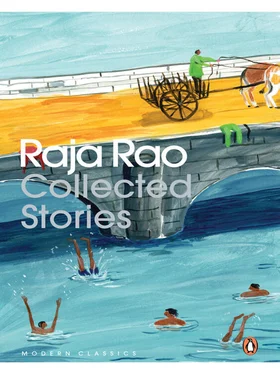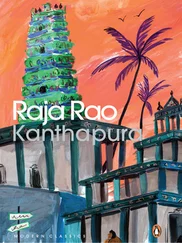Raja Rao - Collected Stories
Здесь есть возможность читать онлайн «Raja Rao - Collected Stories» весь текст электронной книги совершенно бесплатно (целиком полную версию без сокращений). В некоторых случаях можно слушать аудио, скачать через торрент в формате fb2 и присутствует краткое содержание. Год выпуска: 2014, Издательство: Penguin, Жанр: Классическая проза, на английском языке. Описание произведения, (предисловие) а так же отзывы посетителей доступны на портале библиотеки ЛибКат.
- Название:Collected Stories
- Автор:
- Издательство:Penguin
- Жанр:
- Год:2014
- ISBN:нет данных
- Рейтинг книги:5 / 5. Голосов: 1
-
Избранное:Добавить в избранное
- Отзывы:
-
Ваша оценка:
- 100
- 1
- 2
- 3
- 4
- 5
Collected Stories: краткое содержание, описание и аннотация
Предлагаем к чтению аннотацию, описание, краткое содержание или предисловие (зависит от того, что написал сам автор книги «Collected Stories»). Если вы не нашли необходимую информацию о книге — напишите в комментариях, мы постараемся отыскать её.
Collected Stories — читать онлайн бесплатно полную книгу (весь текст) целиком
Ниже представлен текст книги, разбитый по страницам. Система сохранения места последней прочитанной страницы, позволяет с удобством читать онлайн бесплатно книгу «Collected Stories», без необходимости каждый раз заново искать на чём Вы остановились. Поставьте закладку, и сможете в любой момент перейти на страницу, на которой закончили чтение.
Интервал:
Закладка:
Sitting by the Ganges on an autumnal evening, sometimes with his wife and his mother, but often alone, and looking at the auspicious curve Mother Ganga takes down by Rajghat and temple lights which bring bounty to dusk, and while the drums are silenced by the sudden night, Shankar would think: Yes, he would become a businessman. Perhaps a business magnate. One day he would go overseas. (His father may vituperate against his firstborn. Pray, how could a Brahmin go across the dark waters? But even bad fathers like good luck for their sons. After all you could always drink some Ganges water, after your return, say a few mantras, and become Brahmin again.) He saw, did Shankar, a series of mills, cotton mills, ginning and weaving exquisite muslin cloth — you know, like snow, almost like those our weavers wove before the British came. Shankar would run the mill on modern economic methods. That is why he decided he’d a study economics for his MA. With mathematics, economics is an easy play. Economics is just simian sense plus hard numbers. Shankar had some rational sense, and knew a lot about numbers. Also he drew his own chart. Mercury was in the sixth house (and Venus in the seventh) while sun was in the tenth. The trigone makes for business, and even for big business. His knowledge of Gujarati, Tamil, and Hindi would help besides his smattering of Bengali might be of use in Calcutta. The British would one day go — they are preparing to quit anyway (though Shankar played safe, and wore no khadi, and was no Congress volunteer) — and all big business will fall into Indian hands. Prepare from now, and you will win.
Padma brought luck. There’s no doubt about it. She with her Monday fasts and her Friday evening worships, she brought light to this darksome house. And Shankar could not but be a big man, and one evening a clucking wall-lizard even confirmed these hopes.
‘Let’s go home,’ he shouted to his mother and wife. He’d forgotten his cinema. But the wife and mother were not there. After worshipping at the little shrine of Tribhuvana (just on the Harischandra Ghat, some yards down the steps, from their house) they had gone home to prepare the dinner. And a mere few nights later, as if to prove Padma would bring in prosperity, she whispered to him: ‘I think it’s there.’ ‘What’s there!’ shouted Shankar, sitting up, laying aside his glasses and textbooks. ‘Hé, what’s there, Padma? Speak!’—‘Oh may they be unperturbed. I thought this evening, that maybe something’s happening to me.’ ‘Happening to you, Padma, what? Are you ill? Have you the fevers, the coughs, or the furoncles, or what?’ ‘Oh, nothing, nothing at all,’ whispered Padma trying to pull her husband back to silence. ‘Oh just this,’ she said after a moment’s hesitancy. (Whenever Shankar wanted to think, even in darkness, he needed his thick glasses. So he lay his glasses on his nose again, thinking and thinking.) Finally his mind left her, and what she had said, and suddenly jumped on to some problem of University physics. That Schrödinger equation was all a mess of molasses, and he could not understand what was what. However, he would have to go to sleep now and wake early and study. Books are learnt better during early morning hours than in the midnight. Anyway when one has a dance head like Shankar has, Shankar said to himself, one has no hope except drive cattle to village pastures! Hé!
But suddenly remembering his wife had said something to him, he sat up and asked: ‘Padma, what’s the illness? Tell me. You know I can take you to Dr Pandurang (whose father knew my grandfather) or to the civil surgeon Dr Stake, mrcp, frcs, an eminent doctor, or even to Hakim Abdullah. We are well placed here for every form of medical treatment, Allopathic, Ayurvedic, Unani. And because of our family there will be no difficulty in getting anyone. Any bloke you want who carries those stethoscopes and pinch-me pinch-me-not witcheries of the syringe, a Pandit who gives you trichurations of pearl or a Hakim that makes you swallow dung-smelling confections. Anything you like!’ ‘No doctor is needed,’ remarked Padma, laughing. ‘Every woman’s her own doctor.’ ‘You mean you have menstrual troubles,’ he shouted like he would say: ‘I want my matchbox. Hé fetch it for me.’ ‘Oh no,’ she whispered. ‘I think we’re going to have a son.’ And Shankar jumped up, put on the light (they had electricity in the house) and for some reason slipped on his silk shirt, and wept. He never thought such good fortune would come to him. ‘What, to this 3B, a son?’ A son. A real puling little son. Beat the drum and proclaim. ‘Hé, ring the temple bells and proclaim Shankar Narayan Shastri Dravida is going to have a son. His wife has just conceived. Hé jump up. Leap up.’ And he said to his wife: ‘May I bring you a glass of milk?’ ‘No,’ said Padma, ‘it’s late in the night, let us go to sleep.’ ‘Asleep after what you have revealed to me. A butcher may go to sleep after a slaughter, a tax-collector after fleecing his client. But a Brahmin boy dances with joy when a son is conceived by his spouse. Are you all right?’ he asked, trying to pat her on the stomach. ‘All right, all right, I mean,’ he repeated—‘Why yes, no, it’s not a sickness. Why should I be sick?’ ‘I meant,’ shouted whisperingly Shankar, ‘you may need, something? Some halva, peda or something sweet to eat, milk to drink. You may have cravings and demands.’ ‘Oh, not yet,’ said Padma trying to get her husband back to bed. ‘Not yet. It’s perhaps only the second month.’ ‘Quick work you’ve done my wife,’ he shouted. The mother knocked at the door. ‘Is there anything wrong, Padma?’ ‘No, mother. You know how They are. They are just restless. May They go to sleep. All is all right.’
But try as he might Shankar could not go to sleep. How go to sleep when this cosmological event is taking place, as it were, before your very eyes: like the creation of a planet or a galaxy, like some star-spark broken from a planet and falling into empty space, one minute sperm has got stuck with one oviodal cell in the nowhere of space, and there’s going to be a splendid son, a great son. ‘We’ll call him Vishwanath,’ he said to himself. ‘Vishwanath Shastri, hé Vishwanath Shastri?’ he queried, caressing her stomach, ‘will you be a pandit or a scientist or a businessman?’ ‘A pandit like his grandfather, a scientist like his father, and a businessman because of himself,’ she said. ‘No, no, Padma, I am restless. I must do something immediately!’ And before she knew where he was he jumped out on the veranda. After all she could not run after him. It’s just not done. Where was he going? What is he doing?
He came back late, late in the silences of the night. He’d gone to the temple straight and had taken peda and jasmines with him. There was a large crowd because it was a processional day of some sort. He sat with the pilgrims, and sang his part of the Shiva stotram : ‘I may be no orthodox Brahmin,’ he shouted to Padma later, ‘but I know how to articulate my anya and my jnya ,’ and he started his stotram again.
Kashika puradhi natha
Kalabhairavam bhajeth. Kalabhairavam bhajeth.
The Lord of the city of Kashi
Kalabhairavam I praise.
‘And I went to the Ganga and said: Mother Ganga you will have to give me a son. He must be better than me. He must be much much better than me. He must neither smoke nor drink nor womanize. He must be pure ( aparna ) and great. And I threw some flowers at Mother Ganga. And you know how the Mother does, when she answers. She hissed her two-lipped hiss, as if she said the same thing twice over. When Mother Ganga is there what lack of greatness,’ he remarked and wept between his knees. Then he added as if to himself: ‘I am a sinner, and I am going to have a son. I hope he has neither gonorrhoea nor syphilis. I am cured of both.’ ‘Oh slowly, slowly?’ pleaded Padma. ‘The elders are asleep.’ ‘I speak to the walls, to these ancestral walls,’ he cried. ‘They know me and I know them. Walls, walls, makes my son good. Make him eminent. Don’t make him a Gandhi-gander. He must be virile and bright. Make him worthy of Padma,’ he said, and as if in a sudden frenzy took hold of his wife’s two feet, and sobbed and sobbed. ‘A sinner, Padma, touched his wife’s holy feet.’ ‘Oh, may They not do such inauspicious things. Please, please, I’m just a country chit.’ The Vishwanath temple gongs struck and cleared the air, as if for all time. A large lit emptiness fell over holy Benares. Then something suddenly happened to Shankar. He hurled himself on the bed and fell fast asleep next to his wife. The Temple prasad lay at their head. He felt for the first time intrepid.
Читать дальшеИнтервал:
Закладка:
Похожие книги на «Collected Stories»
Представляем Вашему вниманию похожие книги на «Collected Stories» списком для выбора. Мы отобрали схожую по названию и смыслу литературу в надежде предоставить читателям больше вариантов отыскать новые, интересные, ещё непрочитанные произведения.
Обсуждение, отзывы о книге «Collected Stories» и просто собственные мнения читателей. Оставьте ваши комментарии, напишите, что Вы думаете о произведении, его смысле или главных героях. Укажите что конкретно понравилось, а что нет, и почему Вы так считаете.












